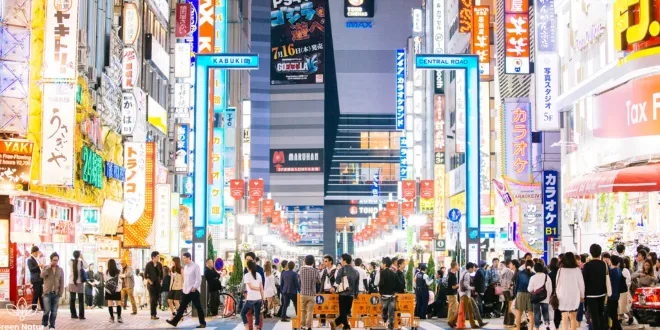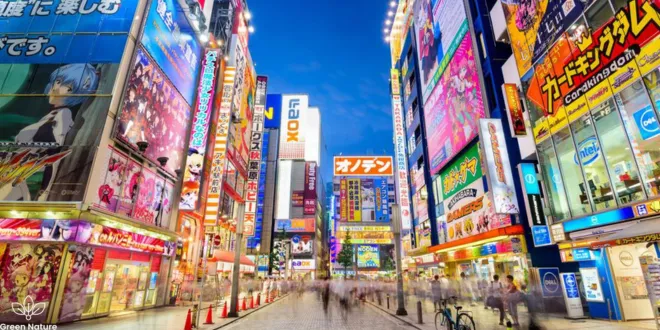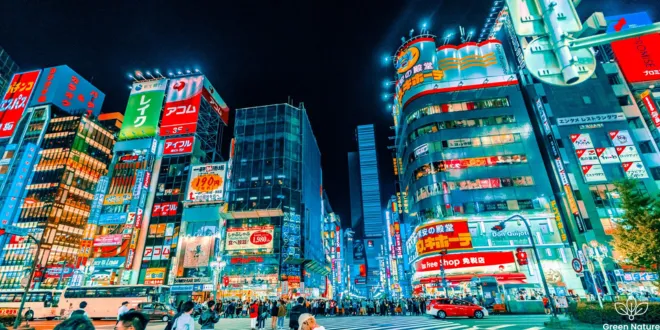Tokyo is a city where the past and future exist in perfect harmony, making it the ultimate destination for both culture enthusiasts and tech lovers. From ancient shrines and centuries-old traditions to cutting-edge innovations and digital wonders, Tokyo culture offers a unique blend of traditional and modern experiences. Whether you’re exploring the serene temples of Asakusa, diving into the neon-lit streets of Akihabara’s tech district, or immersing yourself in the world of anime and manga culture, Tokyo never ceases to amaze.
As a global hub of technology and innovation, Tokyo is home to some of the world’s most advanced robotics, AI-driven experiences, and futuristic attractions. Yet, amidst this high-tech landscape, the city continues to preserve its deep-rooted traditions through festivals, arts, and historic landmarks. This perfect contrast between old and new makes Tokyo a must-visit for travelers seeking a one-of-a-kind adventure.
Here’s an in-depth explanation of each subheading along with well-written content for your article “Why Tokyo is the Ultimate City for Culture and Tech Lovers”:

1. Tokyo: Where Tradition Meets Innovation
Tokyo is a city where centuries-old traditions seamlessly coexist with cutting-edge technology. From serene temples nestled between skyscrapers to ancient customs preserved in a fast-paced urban setting, Tokyo is a living example of how a city can embrace the future without losing its cultural roots.
Despite being one of the most technologically advanced cities in the world, Tokyo retains a deep respect for its history. Walking through the city, you can witness the contrast between towering LED billboards and tranquil Shinto shrines, modern fashion districts and historic geisha neighborhoods. This harmony between past and future is what makes Tokyo a truly unique destination.
2. Historic Landmarks That Showcase Tokyo’s Rich Culture
Tokyo’s historical landmarks offer a glimpse into its rich past, from feudal Japan to the modern era. Some of the must-visit sites include:
- Sensō-ji Temple – Tokyo’s oldest Buddhist temple, dating back to 645 AD.
- Meiji Shrine – A sacred Shinto shrine dedicated to Emperor Meiji and Empress Shoken.
- Imperial Palace – The residence of Japan’s emperor, surrounded by beautiful gardens.
- Nezu Shrine – A lesser-known gem with stunning torii gates and a peaceful atmosphere.
Exploring these landmarks allows visitors to appreciate the city’s cultural heritage while being surrounded by the vibrant energy of Tokyo’s modern streets.
3. The Best Museums in Tokyo for Art, History, and Technology
Tokyo is home to world-class museums that cater to both culture and tech enthusiasts:
- The Edo-Tokyo Museum – A fascinating look at Tokyo’s transformation from a small fishing village to a global metropolis.
- Mori Art Museum – A hub for contemporary art, featuring futuristic installations.
- National Museum of Emerging Science and Innovation (Miraikan) – A must-visit for science and tech lovers, showcasing AI, robotics, and space exploration.
- teamLab Borderless – A digital art museum where visitors can interact with breathtaking, immersive projections.
These museums highlight Tokyo’s diverse cultural offerings, making it a paradise for those who love both history and innovation.
4. Akihabara: The Tech and Gaming Capital of the World
Akihabara, also known as “Electric Town,” is a haven for technology enthusiasts, gamers, and anime lovers. Here, you’ll find:
- Massive electronics stores selling the latest gadgets.
- Gaming arcades like SEGA and Taito Station filled with classic and cutting-edge games.
- Anime and manga shops offering collectibles, figurines, and rare finds.
- Maid cafés where visitors can experience Tokyo’s unique themed dining culture.
Whether you’re a hardcore gamer or just curious about Japan’s tech culture, Akihabara is an unforgettable stop.
5. Futuristic Experiences: Robot Cafés, AI Hotels, and High-Tech Shopping
Tokyo’s technological advancements extend beyond gadgets and into daily life. Unique futuristic experiences include:
- Shinjuku’s Robot Restaurant – A high-energy dinner show featuring giant robots.
- Henn-na Hotel – The world’s first hotel staffed by robots.
- Tokyo Plaza Omotesando Harajuku – A shopping center with interactive, AI-driven displays.
- UNIQLO’s Smart Shopping – A fully automated checkout system in their flagship store.
These high-tech attractions make Tokyo feel like a city straight out of a sci-fi movie.

6. The Role of Anime, Manga, and Pop Culture in Tokyo’s Identity
Tokyo is the heart of Japan’s anime and manga culture, influencing pop culture worldwide. Visitors can explore:
- Ghibli Museum – A tribute to Studio Ghibli’s legendary animated films.
- Pokémon Center Mega Tokyo – A paradise for Pokémon fans.
- Nakano Broadway – A shopping complex packed with rare anime collectibles.
- Tokyo Anime Center – Showcasing behind-the-scenes insights into Japan’s animation industry.
Anime and manga are not just entertainment in Tokyo; they are a crucial part of the city’s identity and global influence.
7. Smart City Innovations: How Tokyo is Shaping the Future
Tokyo is at the forefront of smart city technology, integrating AI, robotics, and sustainable urban solutions. Some of the innovations shaping the city include:
- AI-powered security systems ensuring public safety.
- Driverless trains and automated transport making commuting seamless.
- Eco-friendly skyscrapers designed to minimize carbon footprints.
- 5G-powered public services for faster connectivity.
Tokyo’s advancements make it a model for future cities worldwide.
8. Traditional Arts and Crafts That Still Thrive in Tokyo
Despite its high-tech reputation, Tokyo remains a stronghold for traditional Japanese arts, including:
- Ikebana (flower arranging) – A centuries-old practice focusing on harmony and balance.
- Kabuki Theater – Classic Japanese performances featuring elaborate costumes and storytelling.
- Calligraphy Workshops – A hands-on way to experience Japan’s artistic traditions.
- Samurai Sword-Making – Witnessing skilled craftsmen forge legendary katana swords.
These cultural experiences provide a deep appreciation for Japan’s artistic heritage.
9. Tokyo’s Must-Visit Cultural Festivals and Events
Tokyo hosts a variety of traditional and modern festivals throughout the year. Some of the best include:
- Sanja Matsuri (May) – A lively festival at Sensō-ji Temple featuring portable shrines.
- Sumidagawa Fireworks Festival (July) – One of Japan’s most famous fireworks displays.
- Comiket (August & December) – The world’s largest anime and manga convention.
- Tokyo Game Show (September) – Showcasing the latest in video game technology.
Attending these events provides a glimpse into Tokyo’s vibrant cultural life.
10. Blending the Old and New: Where to See Tokyo’s Cultural and Tech Fusion
There are places in Tokyo where tradition and technology merge beautifully:
- teamLab Planets – A digital art museum blending interactive projections with Zen aesthetics.
- Shibuya Scramble Crossing – A futuristic urban landscape with historic charm.
- Odaiba – An artificial island featuring both historic attractions and futuristic innovations.
- Tsukiji Outer Market – Traditional street food meets high-tech vending innovations.
These locations embody the perfect balance of past and future that defines Tokyo.

Final Thoughts
Tokyo is a city like no other, where culture and technology seamlessly intertwine to create an experience that is both futuristic and deeply rooted in tradition. Whether you’re drawn to the timeless beauty of Tokyo culture, the ancient shrines and historic districts, or the vibrant energy of the Akihabara tech district, this city offers something for every traveler. The blend of anime and manga culture, cutting-edge robotics, and traditional arts makes Tokyo a global leader in both innovation and heritage.
For those who seek a destination that embodies both tradition and modernity, Tokyo is the ultimate city to explore. From its high-tech wonders to its deeply ingrained customs, every corner of this metropolis tells a story of balance between past and future. No matter your interests, a trip to Tokyo promises an unforgettable journey through time, technology, and culture.
Frequently Asked Questions (FAQs)
1. How does Tokyo blend traditional culture with modern technology?
Case Study: In Asakusa, visitors can explore the historic Senso-ji Temple, a Buddhist site dating back to the 7th century. Just a few subway stops away, they can experience the futuristic digital art museum teamLab Planets, where immersive technology brings art to life. This contrast highlights how Tokyo culture and technology coexist seamlessly, offering travelers a unique experience where the past and future meet.
2. What are the best places in Tokyo for tech enthusiasts?
Case Study: Akihabara, also known as “Electric Town,” is the heart of Japan’s tech industry. Here, visitors can explore multi-story gadget shops, VR arcades, and robot cafés. The Miraikan Museum in Odaiba showcases Japan’s advancements in robotics and AI, including ASIMO, Honda’s humanoid robot. These attractions make Tokyo a paradise for technology lovers.
3. How can I experience authentic Japanese culture in Tokyo?
Case Study: Travelers looking for authentic Tokyo culture can visit Meiji Shrine, where traditional Shinto rituals still take place. For an even deeper cultural experience, tourists can book a tea ceremony in Ginza, where they learn the art of matcha preparation from kimono-clad tea masters. This allows visitors to immerse themselves in Japan’s rich traditions while still being in the heart of a high-tech city.
4. Why is Akihabara famous for anime and manga culture?
Case Study: Akihabara is the mecca of anime and manga culture, home to stores like Mandarake, which sells rare manga, and Animate, the largest anime store in Japan. Fans can visit themed cafés, such as the Gundam Café, or experience real-life cosplay events. Akihabara is a must-visit for anyone who loves Japanese pop culture and animation.
5. What futuristic attractions should I visit in Tokyo?
Case Study: Tokyo’s Shibuya Scramble Square offers a digital interactive observatory, where visitors can see the city in augmented reality. The teamLab Borderless Museum in Odaiba is another must-see, where technology-driven exhibits react to human movement, creating a fully immersive art experience. These locations prove why Tokyo is a leader in modern technology and digital innovation.
6. How does Tokyo’s public transportation reflect its technological advancements?
Case Study: Tokyo’s Shinkansen (bullet trains) use cutting-edge magnetic levitation (Maglev) technology to travel at speeds over 300 km/h. Additionally, Shinjuku Station, one of the busiest in the world, employs AI-driven crowd management systems to optimize passenger flow. This high level of innovation makes Tokyo’s transport system one of the most advanced globally.
7. Where can I see a mix of old and new Tokyo in one place?
Case Study: In Shibuya, visitors can witness the world-famous Shibuya Crossing, a symbol of modern Tokyo, while just a short walk away, the Shibuya Nonbei Yokocho alleyway offers a glimpse into old Japan with its tiny traditional izakayas. This area perfectly encapsulates the blend of tradition and modernity that defines Tokyo.
8. How is robotics changing daily life in Tokyo?
Case Study: The Henna Hotel in Ginza is staffed by AI-powered robots, showcasing how automation is becoming part of everyday life. At the Robot Restaurant in Shinjuku, performances featuring advanced humanoid robots entertain visitors. Tokyo is at the forefront of AI and robotics, making it a dream destination for tech lovers.
9. What role do Japanese festivals play in preserving Tokyo culture?
Case Study: Despite its technological advancements, Tokyo remains deeply connected to its traditions through festivals like Sanja Matsuri, held at Asakusa Shrine, where locals parade in traditional dress. Meanwhile, modern celebrations like Tokyo Game Show highlight Japan’s influence on gaming and entertainment. This balance between old and new keeps Tokyo culture vibrant and relevant.
10. Why is Tokyo considered the ultimate city for both culture and technology?
Case Study: Tokyo is a city where ancient traditions and cutting-edge innovations thrive side by side. Whether experiencing a samurai sword-fighting class, walking through Ginza’s high-tech flagship stores, or watching a Kabuki performance at the Shinbashi Enbujo Theatre, visitors can engage with both history and the future in a single trip. This fusion makes Tokyo the best destination for culture and technology lovers.
